






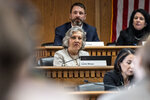
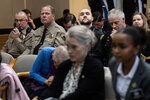

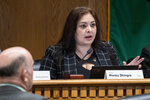

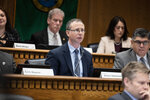


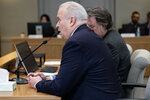




As the Legislature considers adopting three of the six initiatives filed during the current session, supporters and detractors testified Wednesday on the potential ramifications of giving police officers greater flexibility when pursuing fleeing suspects.
If adopted, Initiative 2113 would lower the threshold to pursue a suspect from reasonable suspicion that a person has committed a violent offense to a “reasonable suspicion that a person has violated a law.”
“If enacted, an officer may not engage in a vehicle pursuit unless the person being pursued poses a threat to the safety of others and the safety risks of failing to apprehend or identify that person are considered to be greater than the safety risks of the pursuit under the circumstances,” legislative staff testified.
“I just heard the staff briefing that was in, the initiative is the same as what is in existing law,” Rep. Roger Goodman, D-Kirkland, said while questioning staff.
According to Rep. Jim Walsh, R-Aberdeen, the initiative would “take a very narrow touch to do the one thing, the single action we can take, to most effectively fight crime in Washington state.”
Walsh said in discussions with law enforcement, they’ve told him “the one thing, more than anything we need, is the ability to chase bad people.”
Thurston County Sheriff Derek Sanders, who was among a contingent of law enforcement at the hearing, said in an interview with The Chronicle the initiative is “very important as we try to get things under control in this state.”
“We recognize the concerns as law enforcement. I think you’re going to hear us acknowledge all of the same points that pursuits are dangerous,” Sanders said. “But so has not been doing anything over the past couple of years.”
Sanders said the increase in fatalities and other traffic incidents has "caused far more concern” than police pursuits.
“I think it has tremendous public support,” Sanders said. “More than 5,000 people signed in to support this, and under 200 people signed in to oppose it. I think the will of the people is going to be heard either way. Is it going to happen now or in November?”
Amber Goldade, whose 12-year-old daughter was killed by the driver of a stolen truck, testified that her daughter would be alive if officers could have pursued the suspect during an incident two weeks prior.
“We can’t afford to wait until November for change. Each one of you has a huge opportunity to prevent future tragedies from happening,” Goldade said. “Please listen to the 420,000 Washingtonians who signed the initiative. Both Democrats and Republicans wanting the same thing: safe roads and communities.”
Sonia Joseph, board chair of the Washington Coalition for Police Accountability, said, “Her tragic story started when my firstborn son, Giovonn, was profiled and pulled over in a traffic stop.”
During the incident, Giovonn initially complied with officer requests, before he fled the scene.
“Running away, was that the cause of his death? Could they have mailed him a ticket?” Joseph said. “All of these questions run through my mind daily. I replay every possible scenario of what happened on June 24, 2017.”
Brian Heywood, a Republican donor who spent $6 million to gather signatures for the initiatives, said the initiative will restore “local jurisdiction.”
“As has been noted earlier, this would not prohibit certain jurisdictions from having stricter controls than other places,” Heywood said. “We’re completely fine with that.”
While he testified in support of the initiative, James McMahan, of the Washington Association of Sheriffs and Police Chiefs, said he does not want I-2113 to be “the only option our officers have to apprehend those who commit crimes.”
“We support this initiative and also ask the Legislature to give us the tools to reduce the need for a vehicular pursuit in the first place,” McMahan said. “By enacting the initiative alongside stronger penalties to deter illegal conduct, we think the Legislature can make a significant difference in making our roadways and communities safer.”
The three initiatives heard this week are scheduled for executive sessions in their respective committees in both chambers on Friday morning. The legislature could take further action on the matters during the final week of the session.
The three measures not getting public hearings are Initiative 2109 to repeal the capital gains tax, Initiative 2117 to repeal the Climate Commitment Act, and Initiative 2124 to allow more people to opt out of the state’s long-term care program. Those will likely be decided by voters during the November general election.